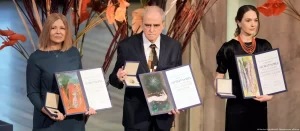The ASF wishes to congratulate this year’s Nobel Peace Prize laureates and wish them further success in their noble endeavours.

Natalia Pinchuk, the wife of imprisoned Ales Bialiatski, Yan Rachinsky, chairman of Memorial and Oleksandra Matviychuk, head of Ukraine’s Centre for Civil Liberties pose
This event, the first since pandemic lockdown, coincided with the UN’s Human Rights Day and highlighted the Russia’s war in Ukraine and the erosion of human rights in Russia and Belarus.
The co-winners of the Nobel Peace Prize include Memorial, one of the Russia’s oldest coalition for civil rights which was shut down by the government last year,
Ukraine’s Centre of Civil Liberties [CCL], and Belarusian activist Ales Bialiatski, the founder of the country’s Human Rights Centre Viasna (Spring) which was set up in 1996 in response to a brutal crackdown of street protests.
Ales Bialiatski previously spent three years in prison, he was released in 2014, then was put in prison without trial since July last year but never stopped the battle for justice.
Oleksandra Matviichuk, director of Ukraine’s CCL described him as “an extremely brave person”. Despite refusing to speak beside her Russian co-winner, Ms Matviichuk praised work with “our partner” Memorial, adding she had “huge respect for all [her] Russian human rights colleagues” who work in difficult conditions. Also, she warned that without proper accounting for the war crimes, peace would not come to Eastern Europe, and called for a new international tribunal.
Yan Rachinsky, the head of Memorial, said in the interview with BBC HARDtalk that his organization had been advised to decline the award, but ignored it. The mission of Memorial remained essential, it works without a legal entity and continues to document and publicize information about violation of human rights and defends the rights of victims, particularly among political prisoners and vulnerable contingent.
Announcing the prize winners, the Nobel Committee said that Memorial was founded on the idea that “confronting past crimes is essential in preventing new ones”. Mr Rachinsky called “remarkable” the decision to award the prize to recipients in three different countries. He said it was proof “that civil society is not divided by national borders, it is a single body working to solve common problems”.
